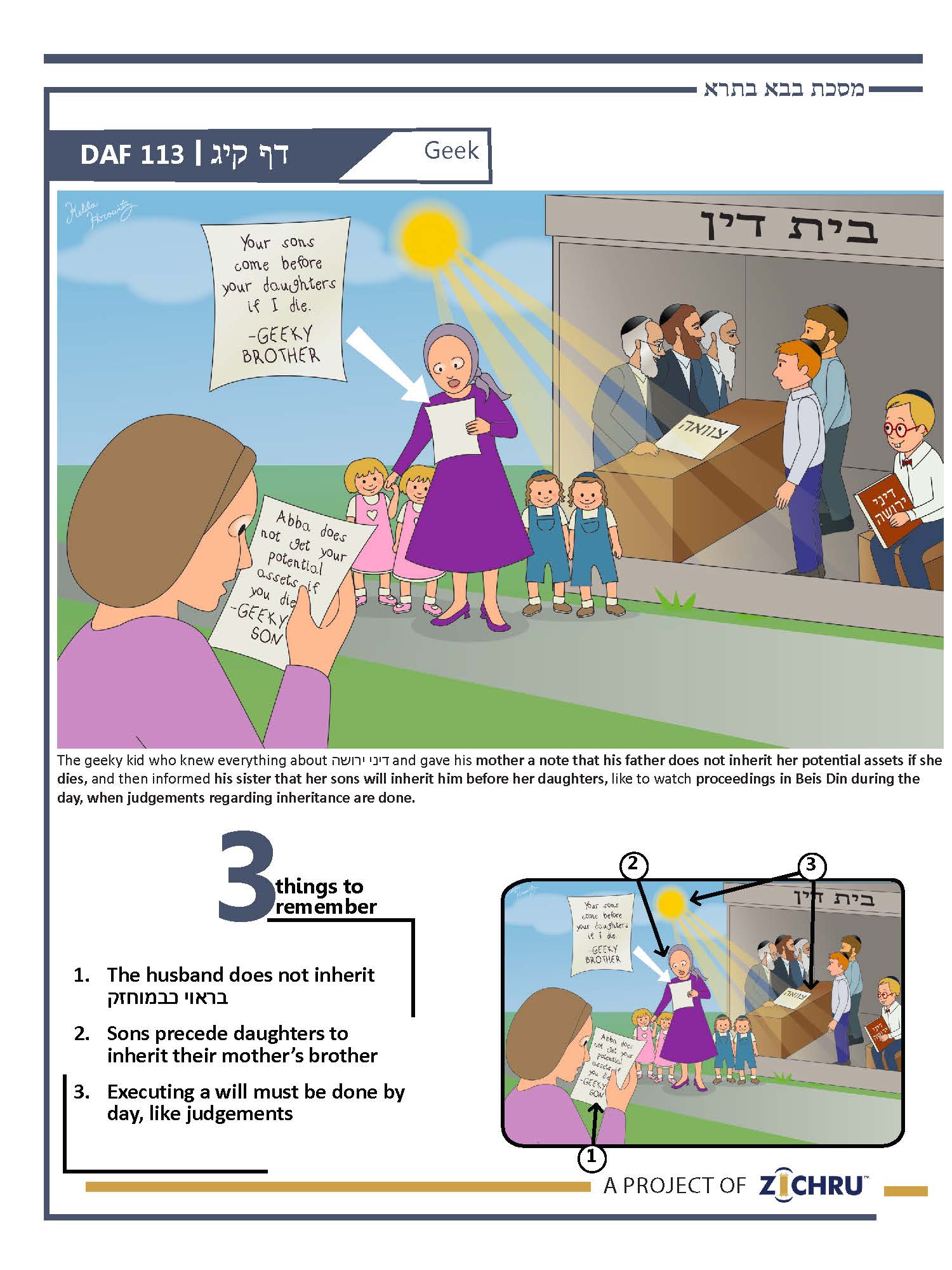Bava Basra - Daf 113
- Audio Timestamps
0:00 - The 3 Sugyos
3:13 - Review of 3 Sugyos
6:13 - Siman
8:38 - 4 Blatt Back Chazarah
16:53 - Pop Quiz (Last 7 blatt)
For access to all Zichru resources including PDFs, and illustrations CLICK HERE
- The husband does not inherit בראוי כבמוחזק
A derashah is quoted: מנין לבעל שאינו נוטל בראוי כבמוחזק – from where is it derived that a husband does not [inherit] the potential assets of his wife as he does inherit her possessed assets (meaning, he does not inherit assets that she stood to inherit, but died before her relative did)? The Gemara quotes two pesukim (cited on the previous Daf), one describing Seguv’s son Yair owning cities which his father did not, and one describing Elazar’s son Pinchas owning property his father did not. The Gemara assumes each incident is where the father’s wife was an heir to her relatives but died before they did. The son inherited the assets, and not the husband, because a husband does not inherit “potential” assets from his wife. The first passuk is inconclusive, because Yair may have inherited from his wife, not his mother. The second passuk is conclusive proof, because although one might argue that Pinchas received it from fields consecrated through a חרם (a neder designating property to Kohanim), the superfluous term "בנו" – his son teaches: נחלה הראויה לו וירשה בנו – it was an inheritance which was fit to be his [Elazar’s], but his son inherited it.
- Sons precede daughters to inherit their mother’s brother
The Mishnah on Daf 108a taught that בני אחות – a sister’s sons inherit her brother (i.e., their, maternal uncle). A Baraisa states: בני אחות ולא בנות אחות – a sister’s sons, but not a sister’s daughters. Rav Sheishess explains this means לקדם – for the sons to precede the daughters in inheriting their uncle. A Baraisa darshens this from "וירש" – “and” he shall inherit: מקיש ירושה שניה לירושה ראשונה – this compares the second inheritance to the first inheritance. This teaches: מה ירושה ראשונה בן קודם לבת – just as with the “first” inheritance (where one’s children inherit him directly), the sons precede the daughters, אף ירושה שניה בן קודם לבת – so too with the “second” inheritance (where another relative inherits one who died childless, such as inheriting an uncle), the sons precede the daughters.
- Executing a will must be done by day, like judgements
A Baraisa darshens the passuk: והיה ביום הנחילו את בניו – and it will be “on that day” that he bequeaths to his sons, teaching: ביום אתה מפיל נחלות – by day you may pass down inheritances, ואי אתה מפיל נחלות בלילה – but you may not pass down inheritances at night. Abaye objected, does that mean that if someone dies at night, his children do not inherit him?! Rather, the Baraisa refers to דין נחלות – executing the division of estates, as a Baraisa darshens: "והיתה לבני ישראל לחוקת משפט" – and it shall be to Bnei Yisroel as a statute of judgement, teaching: אורעה כל הפרשה כולה להיות דין – the entire section of inheritance is established to be judgements and must similarly take place by day. This is illustrated by Rav Yehudah’s ruling: שלשה שנכנסו לבקר את החולה – if three people entered to visit a sick person, and he instructed them to give some of his property to particular people if he dies (as a מתנת שכיב מרע), רצו כותבין – if they want, they can record the instructions as mere witnesses; רצו עושין דין – but if they want, they can execute the judgement themselves and dictate which portion is given to each beneficiary. Rav Chisda said they may only act as judges when they were given the instructions by day.
Siman – Geek
The geeky kid who knew everything about דיני ירושה and gave his mother a note that his father does not inherit her potential assets if she dies, and then informed his sister that her sons will inherit him before her daughters, like to watch proceedings in Beis Din during the day, when judgements regarding inheritance are done.


